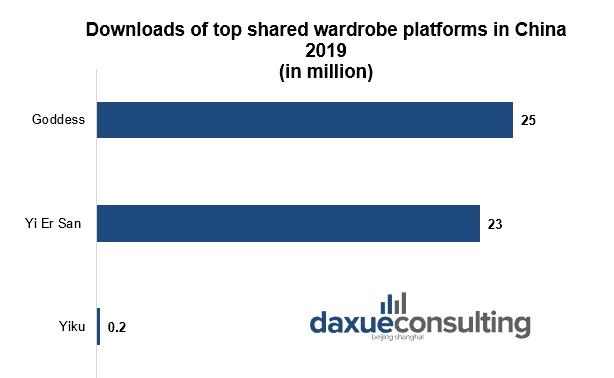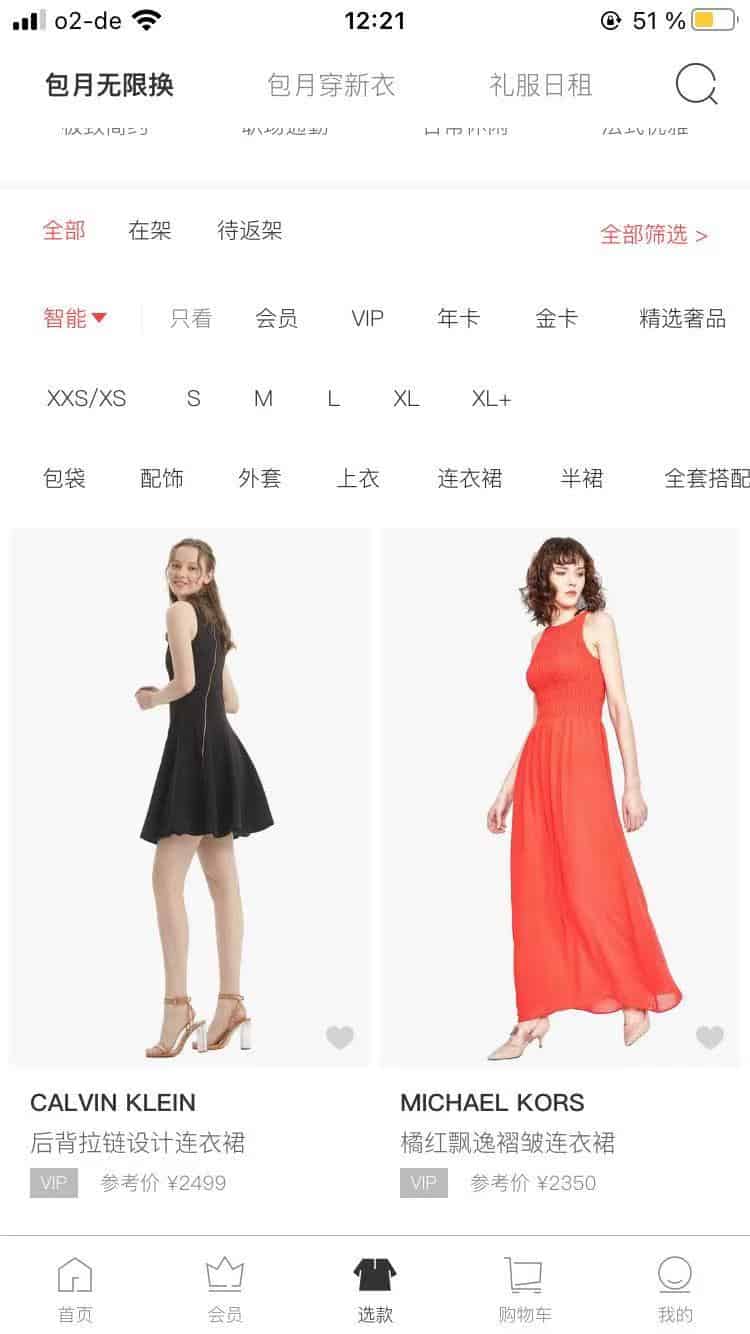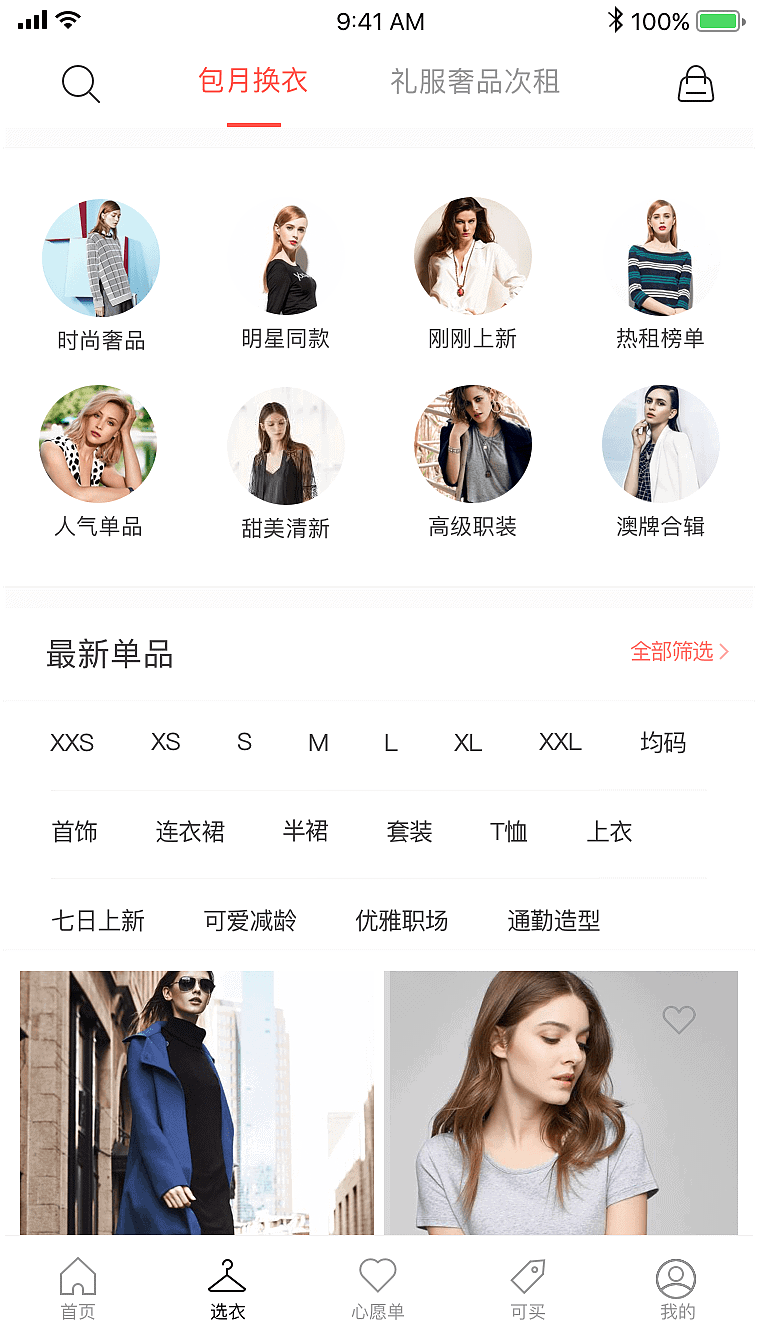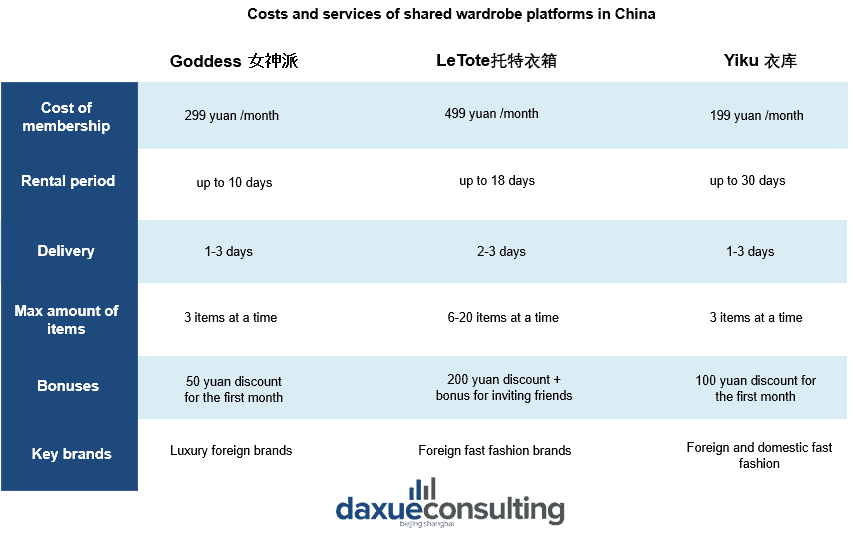According to Euromonitor data, the retail scale of China’s apparel market in 2019 reached 2.19 trillion yuan, a year-on-year increase of 5.29%. China’s fashion market is huge and has maintained a growth trend in recent years. China Commercial Industry Research Institute predicts that China’s apparel market will reach 2.4 trillion yuan in 2021.
As the environmental crisis deepens, the demand for ethical clothing is growing exponentially. Shared wardrobes in China are firstly part of a circular economy aimed at sustainable development, and secondly, they save money on what could otherwise be an expensive piece of clothing.
What are shared wardrobes in China?
The core of shared the wardrobe model is subscription-based renting. Customers pay a sum of money monthly, quarterly, half a year or a year to become a member. Members choose what clothes to rent on shared wardrobe platforms then they send it back after wearing using express delivery.
Why shared wardrobes in China became popular
The phenomena of shared wardrobes in China became popular, as more and more Gen Zs and millennials pay attention to sustainability. Naturally possessing the attributes of sustainable consumption, it satisfies the strong demand of mid-range consumers.
The main customers of shared wardrobe platforms in China are young women, students and white-collar workers.
Key shared wardrobe platforms in China
The sphere of shared wardrobes in China started flourishing in 2014 and 2015 with the establishment of the online shared wardrobe platforms such as “Goddess” and Yi Er San. Facing this fast-growing trend, a large number of participants have emerged, such as Yiku 衣库, LeTote托特衣箱, Yidian Rent and other companies. In 2015, a total of 12 shared wardrobe projects were established in China, but in 2016, platforms such as Magic Wardrobe 魔法衣橱, Aimei Wuyou 爱美无忧, Youyi 有衣, Mocha Box 摩卡盒子, and Color Wardrobe 跳色衣橱 ceased to operate. Some experts believe that high operating costs, a single profit model, and relatively low income are the main reasons for the shutdown of those platforms.
Nowadays, the trend of the “sharing economy” in China started to fade. After the shared wardrobe has undergone a reshuffle, there are currently only a few shared wardrobe platforms in China such as Goddess and Yiku.
According to Chinabaogao.com, in 2019 Goddess topped the list of shared wardrobe platforms in China with 25 million downloads, and Yi Er San ranked second with 23 million downloads. Yiku, which only appeared on the market in 2017, ranked third with 200,000 downloads.

Case study: Goddess 女神派 one of the most successful shared wardrobe platforms in China
Goddess is a women’s clothing rental platform, founded in March 2015. After getting into the women’s shared wardrobe market, it has successively launched services such as regular clothing rental, try-first-buy and other services. With more than 100 top European and American brands and thousands of styles, this platform sends exclusive overseas outfits from New York’s Fifth Avenue and Paris shows. The retail price of most of them is 2000-7000 yuan. Its products include MAX MARA, Vera Wang, BCBG and other luxury brands in China.
One of the reasons for success of this platform is that unlike Yi Er San, Goddess focuses on high quality of fashion items, which are mainly not fast-fashion brands. The products come from domestic and foreign brand agents, and overseas channels account for the majority. The founding team and these agents have had a business partnership for more than ten years, which makes this business model reliable.

How the Chinese shared wardrobe platform Goddess app works
The process is quick and easy. Users can place orders on the app, WeChat or other channels, then Goddess will deliver the clothes to the door. After wearing, users can send it back without cleaning.
The subscription price is 299 yuan a month. Users also can see the actual price of the clothes in the app.
Yi Er San: What caused this Chinese shared wardrobe app to rise and fall
Yi Er San’s slogan was “Only for 499 yuan per month, you can have a beautiful life.” In 2019, this platform had more than 20 million registered users. In May 2019, the platform achieved overall profitability. 75% of Yi Er San’s platform revenue came from membership fees, and the rest came from selling items.
As of the beginning of 2020, the registered users of the platform exceeded 23 million. The users who have used it more than one year accounted for 65% of monthly active users, and there were more than 20,000 clothing items.
Yi Er San’s business model
Yi Er San adopted a “subscription type”, with a monthly subscription of 499 yuan and a yearly subscription of 4,888 yuan. There was no additional charge for renting clothes during the period. After the user placed an order on the APP, the platform sent the clothes to the customer in the form of express delivery from the nearest shipping warehouse. If the clothes didn’t fit or had some quality problems, it could be returned 48 hours after receiving the goods. According to the data, during the peak period of the development of this platform, each product circulated 20 times, and each user used the Yi Er San app for around 10 minutes a day.
Starting in 2019, the situation of Yi Er San has changed dramatically. User complaints have continued to increase and orders have gradually decreased. Some people noticed that the same clothes can be found on Taobao much cheaper. Moreover, some customers got allergies and skin problems as the clothes was used many times by other people.
Why Yi Er San wasn’t successful
In 2021 Yi Er San shut down its service. Not only the quality of the clothes was poor according to reviews, but also the service got worse. For example, the inaccessibility of the customer service was a common complaint. The pandemic was the last straw that broke this platform. The market demand became less strong and more fragmented, as people were worrying about sanitary conditions.
LeTote托特衣箱 – shared wardrobe platform in China focused on foreign brands

LeTote托特衣箱 is a new fashion rental app for women, officially launched in December 2017. It is committed to providing daily rental and try-and-buy services for women from all over the country.
LeTote托特衣箱 members only need to spend the price of a couple fast fashion clothing items per month (499 yuan a month) and they can order 6-20 pieces of clothing and accessories. 22-28 years old white-collar Chinese women are the main users of the platform. The total number of brands on the platform is 109. 80% are foreign fast fashion brands: Zara/Ochirly/MONKI/UR/Mango. 20% are domestic fashion brands and designer brands: JNBY/ La Chapelle/Ladies House, etc.
To attract new users LeTote托特衣箱 developed many preferential discounts. For example, a newcomer will get a discount of 200 yuan in the first month. Moreover, when inviting someone to join as a member, you can get a 70 RMB bonus, and the invited person can also get 70 RMB, which will be automatically deducted when buying a membership.
One of the important features which attracts users is that the platform has a big data artificial intelligence system. After starting a membership, the system will automatically recommends suitable clothing according to your body size and style preferences.
Yiku 衣库 – an example of successful shared wardrobe in China

Another platform is Yiku 衣库. It is a women’s clothing rental app owned by Beijing Yidian Technology Co., Ltd. It provides fashion rental services for women across the country in the form of monthly membership.
After becoming a member, all the items on the platform do not need to be purchased, and they can be changed on demand. Users can place an order for 3 pieces at a time. It also has the next day delivery in first-tier cities. There is no limit to the number of orders placed during the membership period. The cost of membership is 199 yuan.
The advantage of this app is cheap membership, as the platform is focusing mainly on students. Yiku also has the longest rental period – up to 30 days, it is much longer comparing to Goddess (up to 10 days) and LeTote (up to 18 days). Users note that clothes are different from what they usually see on Taobao and the quality is good.

Key takeaways
- Shared wardrobes in China became especially popular in 2015-2016 when renting services in China started growing, however, only several platforms were able to survive.
- Main complaints of customers included poor quality of rented clothes.
- Some platforms are still good and cheap alternative for fashion lovers in China.
- Successful strategies of shared wardrobe platforms include cheap subscription, fast delivery, focus on good quality and advanced artificial intelligence system.





